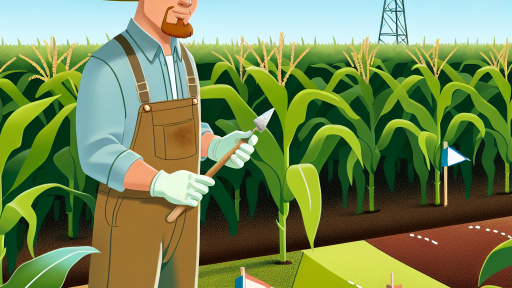Understanding the Concept of Community Supported Agriculture (CSA)
Definition of CSA
Community Supported Agriculture, or CSA, connects consumers directly with farmers.
This relationship allows consumers to purchase shares of the farm’s produce.
In return, they receive a variety of fresh, seasonal foods throughout the growing season.
Benefits for Farmers
CSA programs provide farmers with upfront capital.
This financial support helps cover early-season costs like seeds and equipment.
Additionally, farmers gain a dedicated customer base.
This relationship builds community and encourages local investment.
Benefits for Consumers
Consumers enjoy fresh produce that is often organic and locally grown.
They also receive greater variety than what is available at local grocery stores.
Moreover, consumers take part in farm-related activities like harvest days or farm tours.
Building Trust and Communication
A successful CSA relies on open communication between farmers and customers.
Farmers can share insights about growing practices, challenges, and harvests.
In turn, customers can provide feedback and support initiatives.
This dialogue fosters a deeper connection and trust.
Community Impact
CSA programs often enhance local food systems.
Transform Your Agribusiness
Unlock your farm's potential with expert advice tailored to your needs. Get actionable steps that drive real results.
Get StartedThey support sustainability and encourage environmentally friendly practices.
Furthermore, they can boost the local economy.
By purchasing directly from farmers, consumers help keep money within their community.
Defining Strong Customer Relationships in the Context of CSA
Understanding CSA
Community Supported Agriculture (CSA) connects consumers directly with farmers.
This model enhances relationships through shared risks and rewards.
Farmers receive upfront payment, while consumers enjoy fresh produce.
Characteristics of Strong Relationships
Strong customer relationships are built on trust and transparency.
Communication plays a vital role in these relationships.
Customers should feel valued and informed about their purchases.
Building Trust Through Transparency
Transparency about farming practices fosters customer trust.
This includes sharing details on crop production and sourcing methods.
Consistent updates about farm operations keep customers engaged.
Effective Communication Strategies
Regular newsletters can inform customers about seasonal offerings.
Social media serves as an important tool for engagement.
Responding promptly to customer inquiries builds credibility.
Encouraging Customer Feedback
Soliciting feedback shows customers their opinions are valued.
This can be done through surveys or informal conversations.
Using feedback helps improve overall customer satisfaction.
Creating Community Connections
Hosting farm events connects customers to the agricultural community.
These events promote a sense of belonging among CSA members.
Activities like farm tours increase customer loyalty.
Long-term Relationship Building
A commitment to sustainability attracts like-minded customers.
Educating customers about sustainable practices enhances relationships.
Long-term partnerships benefit both farmers and consumers.
Showcase Your Farming Business
Publish your professional farming services profile on our blog for a one-time fee of $200 and reach a dedicated audience of farmers and agribusiness owners.
Publish Your ProfileThe Importance of Clear Communication with Customers
Establishing Trust through Communication
Clear communication is essential for building trust with customers.
It sets the foundation for a strong customer relationship.
When customers feel informed, they are more likely to engage positively.
Transparent information fosters loyalty and encourages feedback.
Utilizing Multiple Communication Channels
Using various communication channels enhances accessibility for customers.
Channels such as email, social media, and phone support expand reach.
Each channel provides unique opportunities for interaction.
Customers appreciate having options to contact your business.
Listening to Customer Feedback
Actively listening to customer feedback improves service quality.
Feedback provides valuable insights into customer needs and preferences.
Moreover, it allows businesses to adapt and evolve over time.
Responding to feedback shows customers their opinions matter.
Setting Clear Expectations
Clear communication includes setting realistic expectations.
When customers know what to expect, they feel more satisfied.
Timely updates regarding order statuses are crucial for this process.
Transparency about services helps minimize misunderstandings.
Encouraging Open Dialogue
Encouraging open dialogue invites customers to share their thoughts.
It is essential for creating a collaborative relationship.
Businesses should create a welcoming environment for communication.
An open approach fosters a sense of community between customers and the organization.
Providing Consistent Messaging
Consistency in messaging reinforces brand identity.
Customers should receive the same information across all channels.
This eliminates confusion and establishes reliability.
Consistency also strengthens customer trust over time.
Learn More: Ethical Farming Certifications Explained
Strategies for Engaging Customers in the Farming Process
Enhancing Communication
Effective communication builds strong relationships with customers.
Regular updates keep customers informed about farm activities.
Consider using newsletters, social media, or blogs.
This approach cultivates trust and keeps consumers engaged.
Encourage customer feedback to foster two-way communication.
Involving Customers in Decision-Making
Involve customers in choices about crops and products.
Surveys allow customers to voice their preferences.
This participation increases their investment in the farm’s success.
Consider holding community meetings to discuss upcoming seasons.
This encourages transparency and shared decision-making.
Offering Farm Tours and Events
Farm tours provide a firsthand experience of operations.
Organizing seasonal events enhances community involvement.
These activities create memorable experiences for customers.
They also offer educational opportunities about farming practices.
Collaborate with local businesses to enhance these events.
Showcase Your Farming Business
Publish your professional farming services profile on our blog for a one-time fee of $200 and reach a dedicated audience of farmers and agribusiness owners.
Publish Your ProfileCreating a Loyalty Program
A loyalty program rewards consistent customers.
Offer discounts or exclusive products to loyal members.
This encourages repeat purchases and customer commitment.
Promote the program through various channels for maximum reach.
Educating Customers About Farming Practices
Share informative content about sustainable farming methods.
Workshops and online resources enhance customer understanding.
Cultivating knowledge builds support for your farming practices.
Empowered customers are more likely to advocate for your farm.
Start an educational blog to regularly discuss farming topics.
Uncover the Details: Advantages Of Ethical Livestock Farming
Creating Personalized Customer Experiences: A Tailored Approach
Understanding Customer Needs
To build strong relationships, start by understanding customer needs.
Use surveys and feedback tools to gain insights.
This information helps tailor experiences effectively.
Further, analyze purchasing behaviors for additional insights.
Personalizing Interactions
Personalization enhances customer engagement significantly.
Utilize customer names in communications for a personal touch.
Reference past purchases during interactions to create familiarity.
Moreover, acknowledge special occasions like birthdays or anniversaries.
Segmenting Your Customer Base
Breaking down your customer base into segments is essential.
Group customers based on demographics or buying patterns.
This segmentation allows for targeted marketing strategies.
Personalized offers and communications resonate more effectively.
Utilizing Technology for Customization
Leverage technology to create a seamless customer experience.
Implement CRM systems to track customer interactions.
This data aids in crafting personalized marketing campaigns.
Additionally, use AI-driven tools for tailored product recommendations.
Providing Exceptional Customer Support
Exceptional customer support is crucial for relationship building.
Train staff to personalize customer service interactions.
Prompt and empathetic responses enhance loyalty.
Moreover, offer multiple support channels for convenience.
Creating a Loyalty Program
A well-structured loyalty program fosters lasting connections.
Provide rewards that are personalized to each customer.
This encourages repeat business and deeper engagement.
Regularly update the program based on feedback for relevancy.
Delve into the Subject: Raising Animals Ethically On Farms
Providing Consistent Quality and Reliability in Product Delivery
The Importance of Consistency
Consistent quality builds trust with customers.
Reliability in product delivery enhances customer satisfaction.
Customers appreciate knowing what to expect.
Regular quality checks maintain a high standard.
Implementing Quality Control Measures
Establish clear quality control protocols for your products.
Showcase Your Farming Business
Publish your professional farming services profile on our blog for a one-time fee of $200 and reach a dedicated audience of farmers and agribusiness owners.
Publish Your ProfileTrain employees to adhere to these protocols consistently.
Utilize customer feedback to improve processes.
Regular audits help ensure compliance with quality standards.
Streamlining Delivery Processes
Prominent delivery schedules make logistics more efficient.
Partnering with reliable logistics companies reduces delays.
Implement real-time tracking for transparency with customers.
Effective communication about delivery timelines improves trust.
Building Customer Relationships
Engagement with customers fosters lasting relationships.
Responding promptly to inquiries shows commitment.
Offer personalized services to enhance customer loyalty.
Regular updates about product changes keep customers informed.
Feedback as a Tool for Improvement
Encourage customers to provide feedback on products.
Use surveys to gather insights about their experiences.
Analyze feedback to identify areas for improvement.
Implement changes based on customer suggestions when feasible.
Learn More: CSA Farming Best Practices for Modern Farmers

Utilizing Feedback to Improve CSA Offerings and Customer Satisfaction
The Importance of Customer Feedback
Customer feedback plays a crucial role in developing effective CSA offerings.
It provides insights into customer preferences and needs.
Moreover, feedback helps identify areas for improvement.
Engaging customers in this process strengthens relationships.
Methods for Collecting Feedback
Several methods exist for effectively collecting customer feedback.
Surveys offer a structured way to gather information.
Online forums encourage open discussions about services.
Additionally, one-on-one interviews provide deeper insights.
Social media platforms can also facilitate valuable interactions.
Analyzing Feedback to Inform Adjustments
Once feedback is collected, analysis is essential.
Identifying trends allows for targeted improvements in offerings.
Grouping similar comments can highlight common issues.
Furthermore, addressing specific suggestions fosters loyalty.
Implementing Changes Based on Feedback
After analyzing feedback, implement necessary changes.
Quickly addressing common concerns shows responsiveness.
Introduce new features based on popular demand.
Regular updates keep customers informed and engaged.
Transparency about changes enhances trust in your brand.
Communicating Changes to Customers
Effective communication is vital after implementing changes.
Notify customers through emails or newsletters.
Utilize social media to share updates and gather further input.
Encourage ongoing dialogue to maintain engagement.
Measuring the Impact of Changes
Measuring the impact of changes ensures they yield positive results.
Using metrics can help track customer satisfaction over time.
Showcase Your Farming Business
Publish your professional farming services profile on our blog for a one-time fee of $200 and reach a dedicated audience of farmers and agribusiness owners.
Publish Your ProfileRegular check-ins via surveys can provide ongoing feedback.
Moreover, assessing changes allows further adjustments if necessary.
Continuous improvement creates a cycle of enhancement and satisfaction.
Building a Sense of Community Among CSA Members
Creating a Welcoming Environment
A welcoming environment builds a strong community within your CSA.
Start by making introductions personal and inviting.
Encourage members to share their stories and experiences.
This fosters connections among CSA participants.
Additionally, consider hosting an open house event.
Everyone appreciates the chance to explore and learn.
Encouraging Member Engagement
Active engagement enhances the sense of community.
Promote discussions about seasonal produce and recipes.
Organize volunteer days for hands-on involvement.
Provide platforms for members to suggest ideas and feedback.
Implement regular community meetings to share updates.
Cultivating Communication Channels
Effective communication deepens relationships among members.
Utilize newsletters or social media for regular updates.
Ensure everyone feels informed and connected.
Additionally, create a dedicated online forum for discussions.
This allows members to interact anytime, anywhere.
Celebrating Milestones and Achievements
Recognize milestones to strengthen community bonds.
Celebrate the start of each season with a communal gathering.
Host an annual harvest festival to appreciate everyone’s efforts.
Remember to highlight member achievements within the CSA.
This recognition boosts morale and builds pride.
Leveraging Social Media and Online Platforms for Customer Interaction
Understanding Customer Preferences
Knowing your customer’s preferences builds stronger connections.
Utilize surveys and polls on social media platforms.
This information helps tailor your services effectively.
Creating Engaging Content
Engaging content attracts and retains customers’ attention.
Use videos, infographics, and articles to pique interest.
Furthermore, highlight customer testimonials and success stories.
Utilizing Various Social Media Platforms
Different platforms serve unique audiences.
Use Instagram for visually appealing content.
Consider Twitter for quick updates and news announcements.
Facebook offers community-building opportunities through groups.
Encouraging Two-Way Interaction
Interaction fosters a sense of community among customers.
Promptly respond to comments and messages on your posts.
Create discussion threads or Q&A sessions to encourage dialogue.
Promoting Special Offers and Events
Social media is an excellent channel for promotions.
Share exclusive discounts or events to entice customers.
This strategy enhances visibility and encourages sharing.
Showcase Your Farming Business
Publish your professional farming services profile on our blog for a one-time fee of $200 and reach a dedicated audience of farmers and agribusiness owners.
Publish Your ProfileMonitoring Feedback and Analytics
Regularly review feedback to understand customer sentiment.
Use analytics tools to track engagement metrics.
This data guides future strategies and content creation.
Building a Brand Community
Nurturing a community around your brand strengthens loyalty.
Encourage customers to share their experiences online.
Feature user-generated content to showcase real-life usage.
Staying Authentic and Transparent
Authenticity resonates with customers and builds trust.
Share behind-the-scenes content to humanize your brand.
Transparency about your business practices fosters loyalty.
Hosting Events to Foster Relationships and Educate Customers
Importance of Hosting Events
Hosting events significantly enhances community engagement.
These gatherings create opportunities for personal connections.
They also enable customers to learn about your CSA offerings.
Types of Events to Consider
Consider organizing farm tours for your customers.
These tours provide a firsthand look at your practices.
They also allow customers to connect with the farm environment.
Workshops can be beneficial for teaching specific skills.
Cooking demonstrations showcase how to use offered produce.
Lastly, community festivals can attract a diverse audience.
Creating Inviting Atmospheres
Ensure events are family-friendly to encourage attendance.
Include activities for children to engage different age groups.
Sufficient seating and shade create a comfortable environment.
Offer refreshments to make the experience enjoyable.
Educating Through Events
Use events to educate customers about sustainable practices.
Share stories of farming methods to build emotional connections.
Highlight the benefits of local produce for community health.
Provide handouts for customers to take home useful information.
Encouraging Feedback and Interaction
Incorporate feedback sessions during events for insights.
Create interactive discussions to encourage customer participation.
Use surveys to gather opinions on future events.
Understanding customer preferences enhances future planning.
Building Long-term Relationships
Regular events help establish trust with customers over time.
These relationships lead to stronger community ties.
They also foster loyalty and ongoing support for your CSA.




